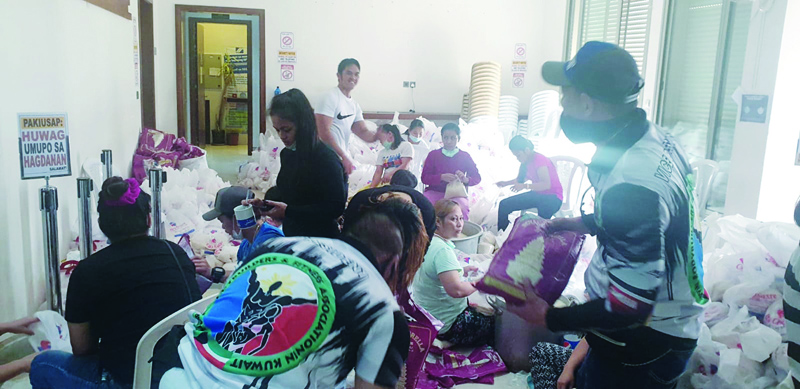
By Ben Garcia
KUWAIT: The Philippine Embassy in Kuwait announced Manila's cash assistance program to help Filipinos in dire need during the lockdown caused by COVID-19. The embassy will hand over cash amounting to $200 to Filipinos who were terminated or abandoned by their employers, are currently jobless or are not being paid by employers. Since the start of the partial lockdown in Kuwait on March 1, a number of Filipinos have been appealing for help.
"This is not unique to Kuwait - this problem is global. We have millions of Filipinos around the world calling for embassy assistance. Of course we cannot turn our back to this request - that is why our Labor Secretary Silvestre Bello, with the authorization of our President Rodrigo Duterte, came up with the program to help ease the burden of our people through cash assistance while waiting for normalcy.
We have funds being disbursed at every post to ease the burden of Filipinos. So in this time of crisis, we want to show that our overseas labor office cares," Philippine Assistant Labor Attache to Kuwait Cathy Duladul told Kuwait Times on Sunday.
"From the time we launched the program in the second week of April, we've received 10,122 applications. We need proof that you've lost your job and have no work and no pay. In the absence of such documents, they can submit a personal undertaking bearing the name of the applicant, name of the company and the date from which they haven't received their salaries. We ask them to sign the application form and send the documents back to us. We also need copies of their passport or any Philippine government identification card and send it by email," Duladul said.
According to Duladul, approved applicants will be notified through email and cash can be collected from various money remittance centers in Kuwait. "We have accredited at least four money remittance companies to hand the cash assistance, which will be mentioned in the email," she said. She called upon Filipinos to follow the guidelines being implemented in Kuwait, especially with regards to COVID-19, and abide by the rules and regulations of the country.
Food relief drive
Meanwhile, parallel to the cash assistance program of the Philippine government, the embassy also launched a food relief drive for Filipinos in Kuwait. "The grocery packages comprise of rice, noodles and canned food. Sometimes we include milk, oil and diapers for babies. These are all basic needs of Filipinos," said Embassy Welfare Officer Llewelyn Perez, who said the food drive has been going on for two weeks now.
When asked if the food drive is also funded by the Philippine government, he said: "Most of the money is from the Overseas Workers Welfare Administration, but also donated by companies and individuals. This relief program is separate from the Department of Labor and Employment's efforts. We have a separate fund for this program to help and give food to Filipinos who are in need. Even if avail the cash assistance, you can also avail the food packs. So far we have distributed 7,000 grocery baskets, and we will be doing this until the condition normalizes," Perez said.
The embassy has tapped the assistance of all Filipino organizations in Kuwait to deliver the food relief packages to Filipinos in Kuwait. "We are doing it per governorate - house to house or building by building," she noted. "We know the necessity of the project because we have many Filipinos in Kuwait who have no work and no pay during this pandemic.
All they need to do is contact our coordinators and request for assistance on our website and Facebook accounts of volunteers in each area in Kuwait. Just inform us that you need the grocery packages and we will deliver it to you at your doorsteps through our volunteers," she said.
The embassy thanked some NGOs for pioneering the food drive and showing their support to fellow Filipinos during the pandemic, like Pinoy Arabia ME, Sandigan, IWOK, AKO-OFW, ASFOK and others from the Alliance of Filipino Organizations in Kuwait. "They've been very organized and we laud them for their efforts. We can do it alone, but we involved Filipino organizations for easy mobilization and quick delivery of goods to the most needy within the community," Perez concluded.




